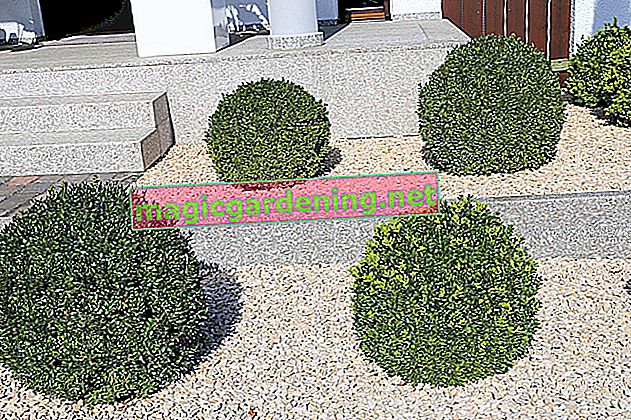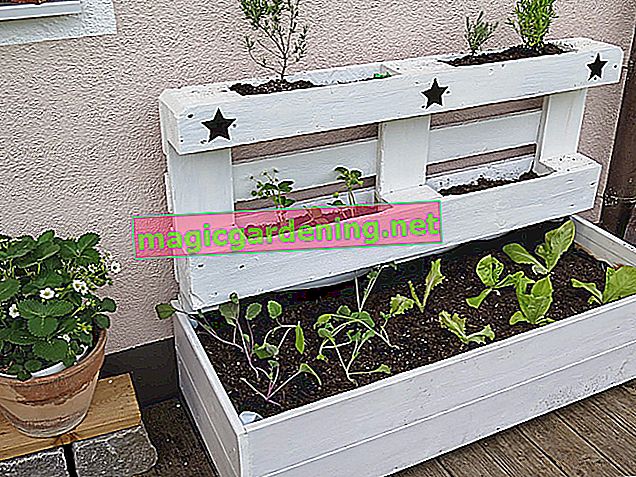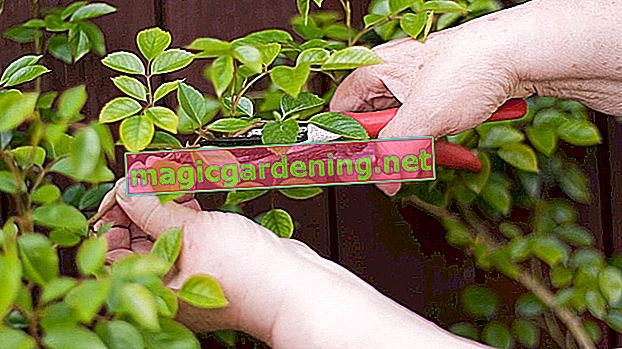
Tip 1: How to mow the lawn correctly has to be learned - this is how it works
Mowing is one of the pillars of professional lawn care. A beautiful lawn is based on 2 central factors: regularity and the cutting height. If you coordinate these two aspects with one another, a green lawn will develop by itself. This is what matters:
- Mow the lawn for the first time in the spring from a height of 8 centimeters
- Mow the lawn every 7-10 days during the growing season
- Do not work the green with the mower when it is wet or under blazing midday sun
- In normal weather, the cutting height should not be less than 3-4 centimeters
- Do not mow after the first frost
also read
- Liming the lawn properly - the 10 best tips
- Fertilize lawn properly - the 10 best tips
- Lawn maintenance in July: choosing the best fertilizer
A green lawn needs a minimum height of 5 centimeters in order to provide sufficient shade for the root area when it is dry. In midsummer, the green should therefore thrive a little higher.
Tips
> The robotic lawnmower not only mows the lawn regularly, as if by magic. The battery-operated device scores with a pleasant side effect. It is far too uncomfortable and restless for moles and voles, where the hummingbird drives all over the lawn. The unsightly hills and holes in the lawn will quickly become a thing of the past.
Tip 2: Simply comb out what doesn't belong there
At the end of winter, a thick carpet of moss and nasal weeds prevent a beautiful lawn from developing. In order to properly care for the green, the very radical technique of scarifying is used. Special devices use knives to scratch the grass surface 3-10 millimeters deep in order to comb out felt and weeds. How to do it:
- Scarify the lawn immediately after the first mowing
- Work the weeded area lengthways and crossways
- Carefully sweep and dispose of all moss and weeds
When a green lawn has turned into a moss-covered tundra at the end of summer, experienced hobby gardeners bring out the scarifier one more time. In August / September they work the stressed green again as part of the autumn care program.
Tip 3: how to aerate the lawn like a pro
In the course of time, the sod increasingly compacts on an intensively used lawn. In this case, scarifying alone is not enough to maintain the green in the best possible way. Now is the time for aerators. These devices punch hollow nails up to 10 centimeters deep into the ground in order to give the harried grass roots more air. How to do it right:
- Mow the lawn briefly and scarify it thoroughly
- Then work the sward with a manual or mechanical aerator
- Drill holes in the compacted soil at a distance of 15-20 centimeters to ventilate it
The pushed out earth cones must not be trampled again, but wander onto the compost.
Tip 4: Important devices for manual and mechanical lawn care
In order for a beautiful lawn to develop from a grass area, you cannot do without suitable equipment. While simple manual aids make the work easier for the small green, hobby gardeners work a lawn of 500 square meters or more preferably with mechanical support. The following list gives an overview of which devices are properly maintaining your lawn.
| Lawn care equipment | Mechanical devices | Manual devices |
|---|---|---|
| cut the lawn | Petrol, electric mowers, robotic lawn mowers | Cylinder mower |
| Comb out moss | Scarifier | Scarifying rake |
| remove weeds | Scarifier | Weed cutter, hands |
| Aerate the lawn | Aerators | Lawn woodpecker, nail sandals, digging fork |
| Fertilize | Gritter | Hand spreader |
| Liming | Lime wagon | gloved hands |
| Water | Automatic lawn sprinkler | Watering can, water hose |
Tip 5: This is how sand makes the lawn green
If you would like to properly maintain a scarified and ventilated green area so that a lush green lawn develops from it, add further maintenance measures. To protect the sward from compaction in the long term, create an effective drainage with fine quartz sand (€ 14.90 at Amazon *). How to look after your lawn in an exemplary manner:
- Sand the combed and aired lawn
- Washed quartz sand with a fine grain size 0/2 is suitable
- Do not scatter more than half a bucket of sand per square meter
- Finally, water the lawn thoroughly
Work on the sanded surface with a broom until all holes are filled and small bumps are evened out. You maintain the green like an English lawn professional if you apply a top dressing made of quartz sand, peat and fertilizer instead of plain sand. After this premium treatment, a green lawn will thrive all the more splendidly.
Tip 6: Liming properly - raise the pH value carefully
A beautiful lawn will not thrive in an over-acidic soil. Experienced hobby gardeners commission a soil analysis every 2 to 3 years or test the pH value in the lawn themselves. If the result falls below 5.5, there is immediate need for action. Targeted liming raises the value to the ideal level of 6-7. That is how it goes:
- Liming the lawn in spring, followed by scarifying and airing
- Use the spreader to spread the garden lime (€ 9.46 at Amazon *) in the recommended dosage
- Ideally, use a mild algae lime, vital lime or rock flour (€ 14.95 at Amazon *)
- If it is not raining, water the limestone lawn thoroughly
If the pH value is within an acceptable range, we recommend maintenance liming every 2 to 3 years. In this way, you maintain the lawn prophylactically before moss and weeds can spread in the acidic soil. If you lime the green area in a low dose of 125 to 160 grams per square meter, the result is a moss-free, green lawn.
Tip 7: No starvation diet - better balanced organic fertilization
As often as devices work the lawn, nutrient-rich biomass is always lost. This is especially true when mowing the lawn. If you want to look after your green carpet properly, you shouldn't do without repeated fertilization. A beautiful lawn develops in harmony with nature if you give preference to organic or organic-mineral preparations. How to fertilize with expertise:
- Fertilize lawns with normal use in March / April and September / October
- Also maintain heavily used lawns with fertilizer in June / July
- Apply a mineral-organic long-term fertilizer or fertilize with compost or plant manure
- Ideally, fertilize after working the lawn and then water thoroughly
While the lawn mainly requires nitrogen and phosphorus in spring and summer, the autumn supply of nutrients serves to prepare for frosty temperatures with potassium. In the mineral-organic area, patent potash comes into consideration. If you fertilize purely ecologically, comfrey liquid manure provides everything you need to properly maintain the lawn before winter.
Tip 8: Water dry lawns - it's not just the amount that matters
Maintain your lawn in a balanced way with fertilizers, sand and lime, extensive watering rounds off the care. In addition, a green lawn will be lost if you do not water it well when it is dry. Here it is important to apply the right amount of water. A beautiful lawn does not want to die of thirst or be drowned. The following rules of thumb may serve as a guide:
- Sprinkle the lawn in summer drought
- Never water the green in direct sunlight
- Water ideally in the early morning or late evening
- Start watering at the first signs of wilting
The amount of water depends on the nature of the soil. On loose sandy soil you water with 10-15 liters, on loamy-clay soil with 15-20 liters of water per square meter. You will be knowledgeable about watering the lawn 1-2 times a week instead of watering a small amount daily.
Tip 9: Mulching and mowing in one go
Modern hobby gardeners combine lawn mowing and fertilizing in a single operation. This can be done very easily with a mulching mower. These devices chop the clippings into tiny particles in order to organically mulch the green. This saves time because there is no more grass catcher to empty. In addition, there is no need for additional fertilization, something that both purse and nature are happy about.
Tip 10: Skilful reseeding irons out small defects - this is how it works
A sparse, patchy lawn can be cultivated into a dense, green carpet with reseeding in next to no time. As long as there is still a remnant of green lawn, there is no need for the costly new planting through professional reseeding. This is how it works:
- Mow the lawn in spring or autumn and scarify in places or over the whole area
- Level out any unevenness with a mix of compost and sand
- Spread lawn seeds for reseeding by hand or with the spreader
Last but not least, sieve the light germs thinly with sand, roll the re-sown area smooth and water extensively.
Tips
Which turf mix does the turf whisperer from tennis mecca Wimbledon actually prefer? To put an end to the eternal serve-and-volley bum-bum tennis, the grass mix was changed in 1995. Instead of the previously favored mixture of 70 percent ryegrass with 30 percent red fescue, today's tennis cracks only have ryegrass at their feet.








